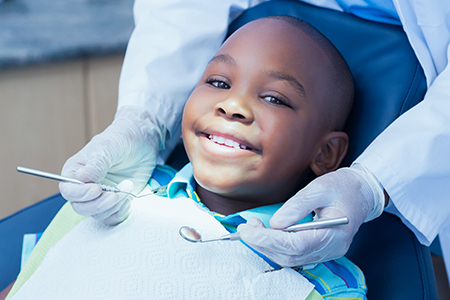Call Today
(908) 852-3693

At the office of Dr. Anthony Iuvone, DMD, the health and development of your child's smile are our top priorities. Our goal is to help children build strong habits that support a lifetime of healthy teeth and confident smiles.

The earliest years set the tone for oral health habits that follow a child through school and into adulthood. Starting dental care early—gentle hygiene, age-appropriate toothbrushing, and routine checkups—turns a foreign appointment into a predictable, manageable part of life. Parents who establish consistent routines at home give their children a head start on preventing decay and building confidence at the dentist.
Our approach emphasizes coaching and encouragement. We work closely with parents to demonstrate brushing and flossing techniques, explain safe teething strategies, and suggest small, practical changes that make a big difference over time. When a child sees oral care as a routine rather than a chore, cooperation improves and outcomes follow.
Prevention is more than technique—it’s also timing. Early visits allow us to spot developing concerns and advise on nutrition, pacifier or thumb habits, and other behaviors that influence long-term dental health. Intervening early when problems first appear reduces the likelihood of more invasive care later on.
Beyond the basics, we tailor advice to your child’s stage of development. Toddlers, school-age children, and teens each have different needs and challenges. Our team explains what to expect next and how to support healthy growth at every phase.

Routine dental exams do more than check for cavities; they track how a child’s teeth, jaws, and bite are developing. At each visit we review medical and dental history, examine the teeth and soft tissues, and assess jaw function and bite relationships. This ongoing observation helps us identify growth patterns that might benefit from early intervention.
Dental professionals often use digital radiographs selectively to see what isn’t visible on the surface. These images help reveal hidden decay, developing permanent teeth, and bone health, allowing for precise, minimally invasive decisions. We only take radiographs when clinically indicated and explain their purpose to parents.
Cleanings performed during these visits remove plaque and tartar in places that are hard to reach at home. More than aesthetics, these cleanings help reduce inflammation and create a healthier environment for eruption and growth. Parents also receive personalized guidance so home care continues to be effective between appointments.
Tooth decay remains one of the most common preventable childhood conditions. Fortunately, several practical measures reliably reduce risk. Fluoride, when recommended at the right intervals, strengthens enamel against acid attack. Dental sealants create a physical barrier on the biting surfaces of molars where cavities often begin. These treatments are quick, painless, and highly effective in reducing decay in the back teeth.
Equally important is creating an oral environment that minimizes frequent sugar exposure. We guide families on healthy snacking strategies and beverage choices that support tooth resilience and overall nutrition. Small changes in daily habits—consistent brushing with a pea-sized amount of fluoride toothpaste for older toddlers and young children, limiting sugary sips, and timely cleanings—add up to big benefits.
Start dental care early and keep visits consistent so your child becomes comfortable with routine care.
Use age-appropriate brushes and toothpaste, and supervise brushing until your child can clean effectively alone.
Replace sugary drinks with water and choose tooth-friendly snacks that support growth and reduce cavity risk.
Discourage prolonged bottle or sippy-cup use at bedtime; this reduces the chance of early childhood caries.
Address persistent thumb or pacifier habits constructively before they affect tooth alignment or speech.
Protect active smiles with a properly fitted mouthguard for athletes engaged in contact or collision sports.

Infant oral development begins long before the first tooth appears. When the front teeth emerge—often between six and twelve months—they play important roles in eating, speaking, and holding space for permanent teeth. Because baby teeth lay the groundwork for future dental alignment and function, caring for them is not optional.
Parents can begin oral care with simple steps: keeping gums clean with a soft cloth, wiping the mouth after feedings, and introducing a soft toothbrush once teeth start to come in. We offer clear, stage-appropriate guidance so you know what to use and when to progress to the next step.
Teething can be uncomfortable for infants; safe, soothing measures—cold teething rings or gentle gum massage—help ease symptoms. If you notice prolonged fussiness, fever, or feeding difficulties related to eruption, contact us so we can evaluate and advise.
As children enter school, their needs shift. Permanent teeth begin to erupt, eating habits change, and extracurricular activities increase exposure to dental risks. School-age children benefit from reinforcement of daily care plus proactive measures like sealants on newly erupted molars and custom mouthguards for sports.
Beyond preventive treatments, this is an ideal time for education: teaching children how to brush effectively, why flossing matters, and how food choices affect their teeth. Positive reinforcement at home and at dental visits builds healthier habits and greater self-sufficiency.
If orthodontic concerns emerge—crowding, bite irregularities, or early loss of primary teeth—we monitor development and discuss options. Early observation allows us to time referrals or interventions so growth can be guided with the best possible outcomes.
Teen years bring rapid changes in both dental and social priorities. Wisdom teeth, orthodontic treatment, and increased independence in hygiene are common considerations. Our team helps adolescents understand how to care for braces or clear aligners, manage dietary choices that protect dental work, and maintain gum health during growth spurts.
Mindful guidance at this stage focuses on preventing problems that can persist into adulthood. We routinely screen for signs of enamel wear, gum inflammation, or early decay, and recommend interventions that preserve function and appearance as permanent teeth settle into place.
Open communication with teens—respecting their growing autonomy while providing clear expectations—encourages better self-care and long-term responsibility for oral health.
Facial growth and jaw alignment evolve through childhood; some patterns benefit from early orthodontic input. We track growth markers and can advise when a consultation with an orthodontic specialist is appropriate. Early alignment issues are easier to manage when identified promptly, and timely guidance can reduce the need for more complex procedures later.
A balanced diet supports both general growth and oral health. Calcium-rich foods, lean proteins, and crunchy fruits and vegetables help strengthen teeth and encourage saliva flow, which naturally protects enamel. Limiting sugary and acidic snacks reduces decay risk and helps maintain a healthier oral environment.
At every stage, our goal is to provide compassionate, evidence-based care that empowers families. If you’d like to learn more about pediatric dental care or discuss your child’s unique needs, please contact us for more information.
A pedodontist is a dentist who has received advanced specialty training in meeting the dental needs of children from infancy to adolescence. Pedodontists, also referred to as "pediatric dentists," study child psychology, behavior management, caring for children with special needs, methods of handling oral/facial trauma, and various techniques for providing anesthesia and sedation. Pedodontists also understand the complexities of facial growth and development and have the clinical skills required to meet the dental needs of all children at every stage of development. Most of all, pedodontists are passionate about what they do and enjoy working with children. They strive to make every dental experience a positive one as they help children establish a strong foundation for good oral health.
Even before your child is born, their first set of teeth is already forming. In fact, by one year of age, some of your baby's front teeth will have already come into place. While the arrival of your baby's first teeth is only one of many developmental milestones, it represents an excellent time to begin a program of oral care. According to recommendations from the American Dental Association, babies should see the dentist around the time of their first birthdays.
Your baby's first teeth typically begin to appear in the 6 to 12-month range. While this is an extraordinary milestone, you need to be aware that your baby may find the experience a little bit uncomfortable. Teething can make babies feel irritable. They may be fussy, have trouble sleeping, not want to eat, and drool quite a bit.
Although you are powerless to speed up the process of teething, there are a few things that you can do to soothe your baby as the new teeth are erupting into place. Common approaches to helping your baby feel more comfortable while getting new teeth, include teething rings or a cold spoon or moist gauze rubbed over their gums.
Even for these few new teeth, it's absolutely essential to establish an effective regimen of oral care. For information on when your baby's first set of teeth will erupt into place, consult this timeline from the American Dental Association: Eruption Charts
Some children persist in sucking their thumbs or fingers beyond their preschool years. For these children, the activity continues to be a source of comfort, relaxation, and security. It may even help them fall asleep at night. However, it's essential to be aware that in the long-term, a finger sucking habit is not healthy.
If your child's thumb or finger sucking habit is still present when the permanent teeth begin to come in, your child is at a higher risk of developing a bad bite. By the age of five or six years, you need to constructively and gently help your child stop the habit.
It's also a good idea to have a comprehensive evaluation at this time. Your pedodontist can assess if there are any habit related alterations to the alignment of your child's teeth or jaws, or if it is affecting their speech or swallowing patterns. They can also discuss habit control strategies with you, as well as follow your child's bite and facial development as they grow. If interceptive appliances or corrective orthodontic care are recommended, the timetable and best options in care will be explained in complete detail.
Children should have their first dental visit by their first birthday or within six months of the first tooth erupting. Early visits help establish a dental home where preventive habits can begin and parents can get practical guidance tailored to infancy. At the office of Dr. Anthony Iuvone, DMD in Hackettstown, NJ we focus on gentle, age-appropriate exams that make early care positive and routine.
During that first appointment we review medical and dental history, check for signs of early decay, and demonstrate simple home care techniques. These visits are short and low stress, designed to build familiarity with the dental setting and reduce fear later on. Regular early visits also allow clinicians to monitor growth and intervene when habits or developmental concerns appear.
Before teeth appear, keep your baby’s gums clean by wiping them gently with a soft, damp cloth after feedings to remove bacteria and milk residue. Once teeth emerge, introduce a soft-bristled toothbrush and use a smear or pea-sized amount of fluoride toothpaste appropriate for the child’s age. Supervise brushing to ensure all surfaces are cleaned and to build a consistent routine that becomes second nature.
Limit prolonged exposure to sugary liquids and avoid putting your child to bed with a bottle or sippy cup filled with anything but water. Encourage healthy feeding habits and timely weaning from bottles to reduce the risk of early childhood caries. If you notice white or dark spots on teeth, persistent fussiness with eating, or other concerns, contact your pediatric dental provider for an evaluation.
Yes, fluoride treatments and dental sealants are well-established, evidence-based measures that significantly reduce the risk of tooth decay when used appropriately. Fluoride strengthens enamel and helps prevent acid-related breakdown, and topical applications in the dental office are quick and monitored. Sealants protect deep grooves on molars where brushing may not reach, creating a durable barrier against bacteria and food particles.
Both treatments are painless and are applied selectively based on a child’s individual risk and development stage. Your dentist will explain the benefits and any recommendations for frequency so parents can make informed decisions. Using these preventive tools alongside good home care creates a strong defense against cavities.
Teething discomfort is common and can usually be managed at home with simple, safe measures such as chilled (not frozen) teething rings and gentle gum massage with a clean finger. Over-the-counter topical products and medications should be used cautiously and only under guidance from a pediatrician or dentist. Keeping feedings calm and offering a cool washcloth can also provide relief without exposing the child to unnecessary risks.
If your child has prolonged fever, severe irritability, refusal to eat, or any unusual symptoms during teething, contact your dental or medical provider for evaluation. These signs may indicate an infection or another issue that needs attention. Routine dental visits provide opportunities to discuss teething strategies and what to expect during each stage of eruption.
Thumb sucking and pacifier use are normal soothing behaviors in infancy and early childhood, but they can begin to affect tooth alignment if they persist beyond the preschool years. Most children stop on their own by age 3 to 4, and many professionals recommend gentle strategies to encourage weaning before permanent teeth start to erupt. Constructive approaches focus on positive reinforcement and gradual limits rather than punishment.
If a habit continues past age 4 or begins to change the position of the teeth or the roof of the mouth, speak with your dentist about practical interventions. The dental team can offer age-appropriate guidance, habit-monitoring tips, and timely referrals if an appliance or specialist consultation would be beneficial. Early discussion helps prevent the need for more complex orthodontic measures later on.
For dental emergencies such as a knocked-out tooth, a tooth that is loose or fractured, or severe pain, seek prompt dental care to preserve oral health and function. Gently rinse any displaced tooth with water, avoid handling the root, and if possible place it back in the socket or transport it in milk or saliva while heading to the dentist. For soft tissue injuries, apply gentle pressure with a clean cloth to control bleeding and contact your dental provider for immediate guidance.
Timely attention can improve outcomes, especially for permanent teeth that have been displaced or avulsed. Your dental office can advise whether an immediate visit is needed and what interim steps to take at home. Keep a list of emergency contact instructions from your dental practice so you can act confidently if an urgent issue arises.
Most children benefit from dental exams and cleanings every six months, but your dentist may recommend a schedule tailored to your child’s risk for decay and specific developmental needs. Routine visits typically include a gentle cleaning to remove plaque and tartar, an oral exam to assess growth and development, and age-appropriate guidance for home care and nutrition. These appointments are also an opportunity to monitor eruption patterns and discuss preventive treatments such as fluoride or sealants.
For children with higher decay risk or certain medical conditions, more frequent visits may be advised to maintain a healthy oral environment. The dental team will communicate a personalized plan and explain the reasons behind their recommendations. Consistent preventive care between appointments helps reduce the need for restorative treatment later on.
Yes, children who play contact or collision sports should wear properly fitted mouthguards to protect teeth, lips, and jaws from injury. A custom mouthguard made by a dental professional offers the best combination of fit, comfort, and protection compared with one-size-fits-all options. Custom appliances are fabricated from impressions of the child’s teeth so they stay securely in place without interfering with breathing or communication.
When evaluating for a mouthguard, the dental team will consider the child’s sport, any orthodontic appliances, and growth changes to ensure an appropriate design. Parents should bring the child to the dental office for fitting and periodic checks as the child grows. Proper care and storage will extend the life and effectiveness of a mouthguard.
Orthodontic evaluation often begins around age 7 so clinicians can identify developing bite issues, crowding, or jaw growth patterns that may benefit from early observation or intervention. Early assessment does not always mean immediate treatment, but it allows providers to monitor growth and plan timing for the most effective approach. Detecting certain problems early can simplify future care and may reduce the complexity of treatment during adolescence.
If signs such as early or late loss of primary teeth, difficulty chewing, pronounced asymmetry, or speech concerns appear, your dentist will discuss whether a referral to an orthodontic specialist is appropriate. The dental team coordinates care and provides guidance on milestones to watch as permanent teeth erupt. Shared decision-making helps families choose the right path based on growth patterns and functional needs.
Reducing dental anxiety starts with creating positive expectations by using calm language, practicing brief role-play at home, and scheduling first visits when the child is rested and receptive. The dental team can use child-friendly explanations, distraction techniques, and gentle coaching to build trust during appointments. Consistent, positive experiences early on make a lasting difference in a child’s comfort and cooperation as they grow.
If a child has significant fear or special healthcare needs, the practice can discuss behavior management strategies that respect the child’s emotional and developmental stage. Options include visits focused solely on acclimation, short gradual procedures, and in some cases professionally supervised sedation for complex care when indicated. Open communication between parents and providers ensures that each child receives compassionate, individualized support.
